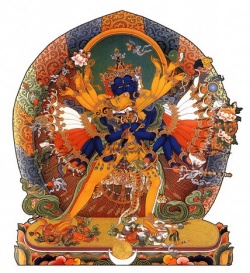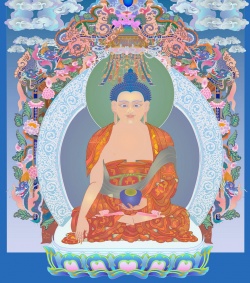Attadīpa suttaṃ: Self Illuminated
Saɱyutta Nikāya:
III. Khandhā Vagga:
22: Khandhāsaɱyutta
1. Mūlapaññāsa
V. Attadīpa-vagga
Sutta 43
Attadīpa suttaṃ
Self Illuminated
Translated from the Pali by Michael Olds
- "Do ye abide, brethren, islands unto yourselves, refuges unto yourselves: taking refuge in none other; islanded by the Norm, taking refuge in the Norm, seeking refuge in none other."
- — Kindred Sayings on Elements, An island to self, F.L. Woodward
- — Kindred Sayings on Elements, An island to self, F.L. Woodward
I HEAR TELL:
[1-2] Once Upon a Time, the Lucky Man, Savatthi Town, Anathapindika Park, came-a ReVisiting.
There he said:
[3] Self-illuminated[1], Beggars, live self-protected, by not else protected;
Dhamma-illuminated, Dhamma-protected, by not else protected.
[4] Self-illuminated, Beggars, living self-protected, by not else protected;
Dhamma-illuminated, Dhamma-protected, by not else protected,
encompass the etiology this way:[2]:
"What is the birth, what is the beginning of grief and lamentation, pain and misery, and despair?"
[5] What is the birth, what is the beginning of grief and lamentation, pain and misery, and despair?
[6] Here, Beggars, the common man, not seeing Aristocrats, unwise to the Aristocratic Dhamma, untrained in the Aristocratic Dhamma, not seeing Real men, unwise to the Dhamma of Real men, untrained in the Dhamma of Real men[3], holds the view: material[4] is self, or self has material, or material is in self, or self is in material. For such a one that material changes and becomes something else. For such a one, that material changing and becoming something else is the appearance of the birth of Grief and Lamentation, Pain and Misery, and Despair.
[7] Or he holds the view: sensation is self, or self has sensation, or sensation is in self, or self is in sensation. For such a one that sensation changes and becomes something else. For such a one, that sensation changing and becoming something else is the appearance of the birth of Grief and Lamentation, Pain and Misery, and Despair.
[8] Or he holds the view: perception is self, or self has perception, or perception is in self, or self is in perception. For such a one that perception changes and becomes something else. For such a one, that perception changing and becoming something else is the appearance of the birth of Grief and Lamentation, Pain and Misery, and Despair.
[9] Or he holds the view: the own-made is self, or self has the own-made, or the own-made is in self, or self is in the own-made. For such a one the own-made changes and becomes something else. For such a one, the own-made changing and becoming something else is the appearance of the birth of Grief and Lamentation, Pain and Misery, and Despair.
[10] Or he holds the view: consciousness is self, or self has consciousness, or consciousness is in self, or self is in consciousness. For such a one that consciousness changes and becomes something else. For such a one, that consciousness changing and becoming something else is the appearance of the birth of Grief and Lamentation, Pain and Misery, and Despair.
[11] But viewing material, Beggars, as changing, corrupt, dying out, ending, thinking "Before, as well as in the here and now, material was a changeable, painful phenomena subject to dying out," and thus with penetrating knowledge seeing it as it really is, he lets go of Grief and Lamentation, Pain and Misery, and Despair, and Letting Go is not Dissatisfied, and not dissatisfied, lives pleasantly, and living pleasantly, they say "This Beggar is cool."
[12] Or viewing sensation, Beggars, as changing, corrupt, dying out, ending, thinking "Before, as well as in the here and now, sensation was a changeable, painful phenomena subject to dying out," and thus with penetrating knowledge seeing it as it really is, he lets go of Grief and Lamentation, Pain and Misery, and Despair, and Letting Go is not Dissatisfied, and not dissatisfied, lives pleasantly, and living pleasantly, they say "This Beggar is cool."
[13] Or viewing perception, Beggars, as changing, corrupt, dying out, ending, thinking "Before, as well as in the here and now, perception was a changeable, painful phenomena subject to dying out," and thus with penetrating knowledge seeing it as it really is, he lets go of Grief and Lamentation, Pain and Misery, and Despair, and Letting Go is not Dissatisfied, and not dissatisfied, lives pleasantly, and living pleasantly, they say "This Beggar is cool."
[14] Or viewing the own-made, Beggars, as changing, corrupt, dying out, ending, thinking "Before, as well as in the here and now, the own-made was a changeable, painful phenomena subject to dying out," and thus with penetrating knowledge seeing it as it really is, he lets go of Grief and Lamentation, Pain and Misery, and Despair, and Letting Go is not Dissatisfied, and not dissatisfied, lives pleasantly, and living pleasantly, they say "This Beggar is cool."
[15] Or viewing consciousness, Beggars, as changing, corrupt, dying out, ending, thinking "Before, as well as in the here and now, consciousness was a changeable, painful phenomena subject to dying out," and thus with penetrating knowledge seeing it as it really is, he lets go of Grief and Lamentation, Pain and Misery, and Despair, and Letting Go is not Dissatisfied, and not dissatisfied, lives pleasantly, and living pleasantly, they say "This Beggar is cool."
Footnotes
- ↑ Is it a light or is it an island? The word "DIPA" means both.
ATTADIPA can mean Self-Island, or Self-lit so: "Live as a light unto yourself" is, at the least, heard.
ATTASARANA Self surrounded, in the sense of "protected" and, also, self-recollected
ANAÑÑASARANA [AÑÑA>AN=not; YA=whatsoever; Latin alius, Gothic aljis, Old Anglo Saxon elles>English else] Not Other-Surrounded or protected
So we can contrast ATTA with ANAÑÑA and be relatively sure the idea is Self/Not Other or Else
So we can contrast ATTASARANA with ANAÑÑASARANA and be relatively sure the idea isn't Self-recollected and Other-recollected.
On the other hand, there is an old link in the word "SARANA" to SARANGSA, The Sun's Rays. "Bathed in Light" comes to mind as a root idea of surrounded and protected.
And then we have the second set of three terms:
DhammaDIPA which would mean Dhamma-Islanded as with Woodward, or Dhamma-lit or illuminated
DhammaSARANA taking refuge in the Dhamma or Surrounded by or Protected by Dhamma
And ANAÑÑASARANA again.
So I am saying: While Be an Island unto one's self is nice, be the Dhamma unto one's self doesn't fit, and there is the underlying theme of light, so mine. - ↑ Yoni yeva upaparikkhitabbo. A phrase which seems to have undergone some 'reconstruction.' It means "thoroughly examine to the womb." However it's use broadened out into 'studious examination' period, and even out into just 'giving thorough attention'. The reader should note the difference which is made to the mental picture when translating "YONI" (womb) as "origin" versus leaving it as "womb." [indicated by square brackets below]:
PALI [with apologies for the lack of diacritical marks]:
:Attadipanam bhikkhave viharatam attasarananam anannasarananam dhammadipanam dhammasarananam anannasarananam (yoni) yeva upaparikkhitabbo . . . kiṃjatika sokaparidevadukkhadomanassupayasa kimpahotika ti . . .
Woodward:
:By them who are islands unto themselves, brethren, who are a refuge unto themselves, who take refuge in none other who are islanded by the Norm, take refuge in the Norm, seek refuge in none other — by them the very [source] of things is to be searched for: thus — "What is the source of sorrow and grief, of woe, lamentation and despair? What is their origin?" - ↑ Please note the way this is translated compared to the way it is usually presented here:
Here, beggars, the common man, not seeing Aristocrats, unwise to the Aristocratic Dhamma, untrained in the Aristocratic Dhamma, not seeing real men, unwise to the Dhamma of real men, untrained in the Dhamma of real men
Vs:
In the case of this case, beggars, we have the case of the untamed, untrained, uneducated common man. Untamed to the discipline of the aristocrats, untrained in the manners of the aristocrats, uneducated in the teachings of the aristocrats; untamed to the ways of the sappurisa, untrained in the craft of the sappurisa, uneducated to the lore of the sappurisa,
The first adheres closely to the Pali, the second shows the variety of meanings of Dhamma. We could use a good translation for the term "Sappurisa." Some others are "puremen" "superman" "worthy ones."
"purisa" is a term meaning "male" [pass up sun one], and "sapp-" means "clairified" as in butter, or gold. Interesting that our culture does not have a good word for a good man. - ↑ Rupa is translated by Woodward as "Body", which is a fairly standard interpretation. Here "material" is used because the meaning is broader and because there is another closer Pali word for body in "kaya" The broader meaning was likely intended because the discussion is of that which individuals consider their own or themselves. Some individuals conception of what material constitutes the self of them extends beyond (some beings out there think the whole world is their own!), or is less than the body [while it is in you, does excrement constitute a part of your idea of yourself or not? Is it a part of the body or not?].




